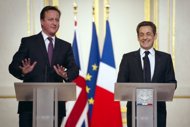Britain, France sign nuclear power deals at summit

The pair took a strong position on the Syrian regime's violence at their summit in Paris, and Cameron took the opportunity of a joint news conference to wish his "friend" Sarkozy well in France's upcoming presidential election.
Celebrating a multi-million pound (euro) nuclear power deal and ever closer defence ties, the Paris summit was a far cry from recent encounters between the pair at European summits in Brussels, where they have clashed bitterly.
"When you look across the foreign policy and defence policy issues we discussed today, I don't think that there has been closer French-British cooperation than at any time since the Second World War," Cameron said.
Cameron and Sarkozy first bonded over the Libyan intervention last year, where British and French jets spearheaded what later became a NATO-led air campaign that eventually led to the overthrow of Moamer Kadhafi's regime.
They have since worked towards closer defence and military industrial ties and have jointly pushed for tougher UN action against Syria's Bashar al-Assad, who is engaged in a bloody crackdown on a pro-democracy revolt.
Both men expressed support for an upcoming conference of an international coalition dubbed the Friends of Syria, which meets next week in Tunis, but called on the Syrian opposition to organise itself better as well.
"We cannot accept that a dictator massacres his own people, but the revolution will not be brought from outside, it will rise from inside Syria, as it has done elsewhere," Sarkozy told the pair's joint news conference.
Both men said the conditions are not ripe in Syria for another Western military intervention like the one that tipped the balance in Libya, but said that they would bring maximum diplomatic pressure to bear.
"In Libya we had a UN Security Council that authorised force, we had an Arab League that wanted action to be taken, we had a clear opposition in Libya that was working on behalf of the whole of the country," Cameron said.
"With Syria we don't have all those circumstances in place but that doesn't mean we should stand back and just say there is nothing that can be done. We need to ... put the maximum pressure on Assad to stop the butchering."
Cameron also gave his backing to Sarkozy's re-election campaign, which promises to be an uphill struggle against opposition Socialist challenger Francois Hollande, who has a clear opinion poll lead with 10 weeks to go.
"We'll be following your fortunes in the weeks to come on the campaign trail and, as I said, I wish you luck," Cameron told Sarkozy, calling the summit "a chance to wish my friend well in the battle he has ahead."
The pair also hailed the civil nuclear deal, in a joint appearance that was noticeably more friendly than other recent encounters.
Cameron said the British engineering firm Rolls-Royce will secure a £400 million (481 million euro, $632 million) share in the work to build Britain's first French-pioneered EPR reactor at Hinkley Point in southern England.
Other British firms will sign deals worth a total of £115 million with France's state-owned energy giant EDF as part of the Hinkley project.
On defence ties, the two leaders announced a new "long-term strategic partnership" on military drones, including a project for France's Dassault and Britain's BAE Systems to develop air combat drones.
They said a joint expeditionary force comprising British and French troops would be operational by 2016.
Cameron and Sarkozy have clashed publicly over how to handle the eurozone sovereign debt crisis and about the French leader's plan for a financial transaction tax, which the British premier recently branded "madness".
"We do sometimes have disagreements on European issues," Cameron admitted, but insisted that they have "a relationship that is easily strong enough to survive the odd bump or bounce when we sometimes have a disagreement."
What the stars mean:
★ Poor ★ ★ Promising ★★★ Good ★★★★ Very good ★★★★★ Exceptional
 Tag:
Tag:
Latest News
More News
- Russian President congratulates Vietnamese Party leader during phone talks (January 25, 2026 | 09:58)
- Worldwide congratulations underscore confidence in Vietnam’s 14th Party Congress (January 23, 2026 | 09:02)
- Political parties, organisations, int’l friends send congratulations to 14th National Party Congress (January 22, 2026 | 09:33)
- 14th National Party Congress: Japanese media highlight Vietnam’s growth targets (January 21, 2026 | 09:46)
- 14th National Party Congress: Driving force for Vietnam to continue renewal, innovation, breakthroughs (January 21, 2026 | 09:42)
- Vietnam remains spiritual support for progressive forces: Colombian party leader (January 21, 2026 | 08:00)
- Int'l media provides large coverage of 14th National Party Congress's first working day (January 20, 2026 | 09:09)
- Vietnamese firms win top honours at ASEAN Digital Awards (January 16, 2026 | 16:45)
- ASEAN Digital Ministers' Meeting opens in Hanoi (January 15, 2026 | 15:33)
- ASEAN economies move up the global chip value chain (December 09, 2025 | 13:32)
















 Mobile Version
Mobile Version